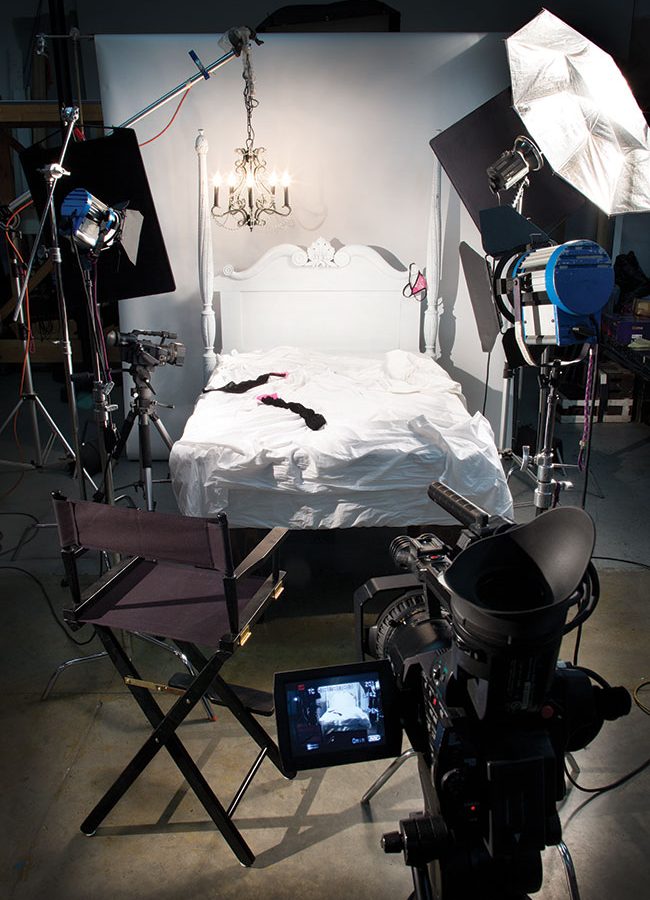
Condom Conundrum
Porn is big business here in the Valley—no big surprise to most of us. So who cares if the actors wear condoms? Turns out we do, as evidenced by the recent voter approval of Measure B. But will the increase in public safety be worth what could be a daunting economic impact?
-
CategoryUncategorized
-
Written byDoug Kriegel & styled
Steven Hirsch is what you might call an A-list movie producer, though you might not be familiar with his name.
That’s because Steven, founder and co-chairman of Vivid Entertainment, is in the hardcore adult movie industry. With popular titles like Kinky Sex Acts and Babysitter Bangers in its nearly 2,000-film video vault, Vivid generates more than $100 million a year in sales revenue.
Steven Hirsch’s wildly successful career has afforded him an envious lifestyle, which he declines to discuss. The 51-year-old multi-millionaire is divorced and recently ended a relationship with Melissa Rivers (Joan’s daughter).
The man whom Forbes Magazine called “The Porn King” is furious these days. He says the passage of Measure B in November could cause him to move the Vivid empire, with more than 100 employees, out of the San Fernando Valley.
“This new law is going to force adult film performers to wear latex gloves, goggles and lab coats in our films. That’s ridiculous. The producers don’t want it, the actors don’t want it, and the audience definitely doesn’t want to see performers having sex while wearing goggles, gloves and condoms,” quips Steven from his large office on Cahuenga Boulevard in Studio City.
When Vivid Entertainment tried doing films with condoms after an HIV outbreak in 1998, according to Steven, sales fell by more than 30%.
 THE NEW RULES
THE NEW RULES
Approved by more than 57% of Los Angeles County voters in November, Measure B mandates that performers who have sexual contact wear condoms. But the Safer Sex in the Adult Film Industry Act involves other restrictions. Producers now will also have to apply for health permits, and people involved in adult films will need to take a training course in blood-borne pathogens. Violators could be subject to civil and criminal misdemeanor penalties.
“We shoot 60 films a year, mostly in the San Fernando Valley. We’re definitely going to challenge this law in court. And if they start enforcing it we will definitely move out of LA County, probably head over to Las Vegas,” says Steven.
Kevin Moore, a 12-year veteran adult film director and performer in fillms such as Panty Pops and Obedience School, says “If you read the details of the law, many of the same protocols that apply to emergency room nurses—when it comes to exposure to bodily fluids—would also apply to adult film sets. It’s just not necessary, because we are already being tested every 14 days. I have already begun scheduling productions outside of LA, but I don’t want to mention the locations.”
THE SAFE SEX DEBATE
“There has not been an on-set transmission of HIV since 2004, when five performers were infected by one actor,” says Christian Mann of Evil Angel, another Valley company that produces pornographic films.
“That’s not true,” counters Mark McGrath of the AIDS Healthcare Foundation. Mark’s claim is supported by data from the Center for Disease Control, which lists one case where an actor in an adult film produced in the Valley tested positive for HIV in 2010.
The CDC report claims the actor had 14 sexual contacts prior to the test. Five of those partners were located, and three of those had been infected with HIV. However, nine of the 14 people who had sexual contact with the actor were never located, according to Dr. Francisco Meza, who conducted the investigation.
SCENE SETTING
You might wonder how the Valley, a bedroom community known as a great place to raise a family and surrounded by mainstream entertainment studios, became the seat of the porn industry. It really boils down to the reason many people choose to live here: space.
The porn industry became centered here in the 1970s. The adult film production companies needed large, cheap warehouse spaces to store the thousands of adult film videos that were being shipped all over the world. Those secluded warehouse spaces turned out to also be a perfect spot for filming.
The Valley also had an ample supply of behind-the-scenes talent. Many of the people hired to do lighting, sound and post-production lived just a stone’s throw away. Plus, when mainstream film and television projects slowed down, porn gigs were there to fill the gap, so much that the area became known locally among workers as the “San Porn-ando Valley.”
ACT TWO
Producers of adult films insist consumers will not purchase movies with actors wearing condoms. Lawyers representing Vivid, among other production companies, have filed suit in the U.S. District Court, claiming that the law imposed by Measure B voters in November violates the First Amendment protection of free expression.
The suit challenges the county’s jurisdiction to regulate adult film production and says Measure B’s provisions are “vague and burdensome.” It asserts that the regulations meant to stem the spread of sexually transmitted diseases are unnecessary, because the industry tests performers for STDs.
Measure B was sponsored by the AIDS Healthcare Foundation (AHF), which spent more than $1.5 million on the ordinance. “The objective here is to protect performers. It’s a safety-in-the-workplace issue,” says Michael Weinstein, executive director of the AHF. “But it’s not just about AIDS; the adult industry’s testing methods have not prevented an epidemic of sexually transmitted diseases.”
Adult film actors are 64 times more likely to acquire chlamydia or gonorrhea than the general population, according to adult industry data compiled by the Sexually Transmitted Diseases journal. “Between 2004 and 2008, there were 2,850 cases of STDs found among adult industry performers, and there are only about 1,500 performers,” says Mark McGrath, who is the public health consultant at the AHF.
Michael Weinstein goes on to say that actors don’t just have sex with people inside the adult film industry; they also have sex with others, and that impacts the public. He is now looking for a sponsor in the California legislature to take the law statewide. Condom use on porn sets is already required under a law passed by the LA City Council, but in the past, the ordinance has only been enforced when there were complaints, and Michael claims there have been none.
 THE ENFORCERS
THE ENFORCERS
Meanwhile, Los Angeles County officials are now left to wrestle with the issue of enforcement. It’s estimated that creating a new bureaucracy to enforce Measure B would cost more than $300,000. LA County Supervisor Zev Yaroslavsky says that in addition to being costly, enforcement will be logistically difficult, because many porn shoots occur in private homes and are never registered with authorities.
The LA County Department of Public Health is the agency responsible for enforcing the new law. So far, they have not released any details about their plans.
“This is a lot more complicated than inspecting restaurants,” says porn producer Christian Mann. “It’s going to cost the county a lot of money just to set up the health department protocols. Where will that money come from in this era of major cutbacks, and who will carry out the enforcement?”
County employees may also need to monitor adult films to check on condom compliance. “Can you imagine Los Angeles County having to hire someone whose job it is to watch porn flicks during the day in the county building?” asks Tim Connelly, former publisher of Adult Video News.
And how would the county go about finding someone to do that job? “Will they post a job notice asking for someone who has experience watching hardcore porn films?” asks one county employee, who requested that we not use his name.
A training program for dealing with bodily fluids will have to be created, along with a special vault to store evidence seized from adult movie sets. “It’s a nightmare,” says one county official, “an expensive nightmare, and there is no precedent for this kind of enforcement.”
ECONOMIC BLOW
Measure B could have a major impact on the Valley economy. The local porn industry pumps an estimated $1 billion into LA County’s revenue stream. And with an already high unemployment level of more than 10%, it could eliminate jobs.
“This will cost us about 10,000 jobs,” estimates Stuart Waldman, executive director of the Valley Industry and Commerce Association, which is opposed to Measure B. “The technical people who work behind the scenes will lose an enormous amount of income. It’s a billion-dollar industry in the Valley, and they will take those jobs and that spending elsewhere if the county starts to enforce this.”
For many of the San Fernando Valley residents who voted in favor of Measure B, it amounted to a “not in my backyard” decision. Some, like JoAnn Kramer who lives in one of the upscale neighborhoods, see the porn industry as an embarrassment. “It’s a shame this part of the city has become known as the San Porn-ando Valley. Let these people go somewhere else,” she says.
THE SEQUEL
So for now, county officials seem to be in a “wait and see” mode. Ditto for the adult industry, as it prepares its legal challenge. No one is commenting on whether the actors are complying with the law. In the meantime, representatives from both sides agree on one thing: Ultimately, the issue will probably be decided in the courts.












